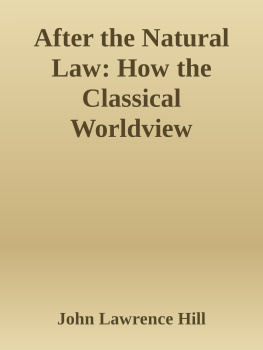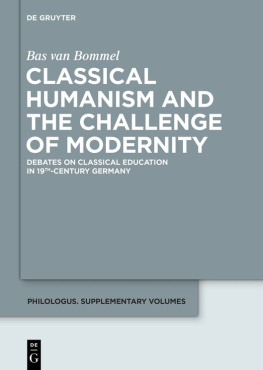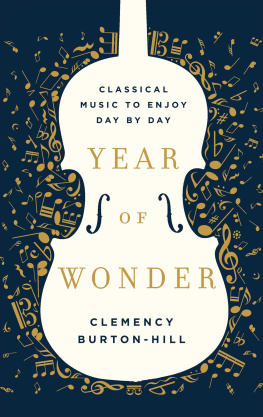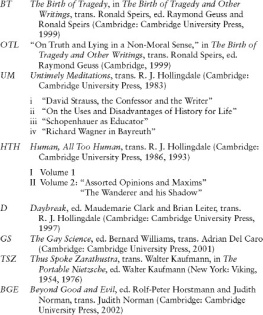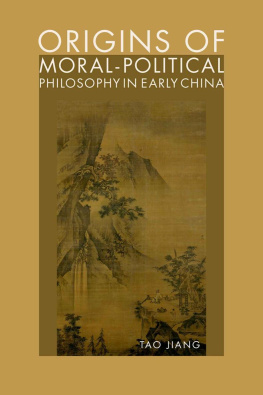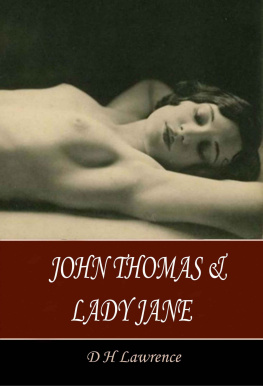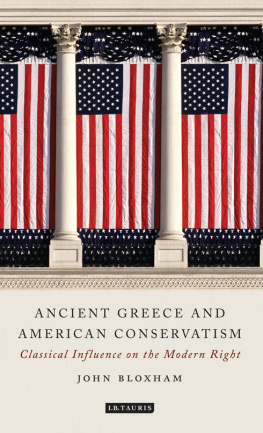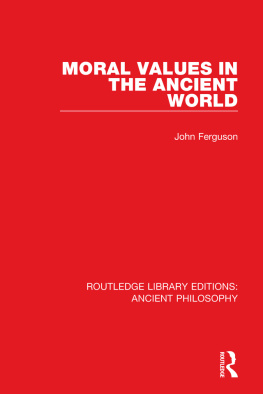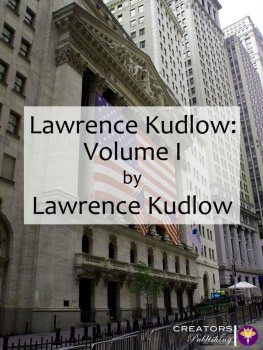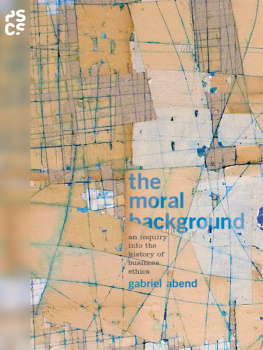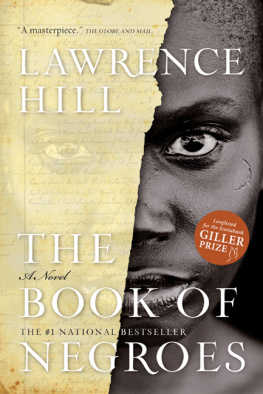John Lawrence Hill - After the natural law : how the classical worldview supports our modern moral and political values
Here you can read online John Lawrence Hill - After the natural law : how the classical worldview supports our modern moral and political values full text of the book (entire story) in english for free. Download pdf and epub, get meaning, cover and reviews about this ebook. year: 2016, genre: Religion. Description of the work, (preface) as well as reviews are available. Best literature library LitArk.com created for fans of good reading and offers a wide selection of genres:
Romance novel
Science fiction
Adventure
Detective
Science
History
Home and family
Prose
Art
Politics
Computer
Non-fiction
Religion
Business
Children
Humor
Choose a favorite category and find really read worthwhile books. Enjoy immersion in the world of imagination, feel the emotions of the characters or learn something new for yourself, make an fascinating discovery.
- Book:After the natural law : how the classical worldview supports our modern moral and political values
- Author:
- Genre:
- Year:2016
- Rating:4 / 5
- Favourites:Add to favourites
- Your mark:
- 80
- 1
- 2
- 3
- 4
- 5
After the natural law : how the classical worldview supports our modern moral and political values: summary, description and annotation
We offer to read an annotation, description, summary or preface (depends on what the author of the book "After the natural law : how the classical worldview supports our modern moral and political values" wrote himself). If you haven't found the necessary information about the book — write in the comments, we will try to find it.
John Lawrence Hill: author's other books
Who wrote After the natural law : how the classical worldview supports our modern moral and political values? Find out the surname, the name of the author of the book and a list of all author's works by series.
After the natural law : how the classical worldview supports our modern moral and political values — read online for free the complete book (whole text) full work
Below is the text of the book, divided by pages. System saving the place of the last page read, allows you to conveniently read the book "After the natural law : how the classical worldview supports our modern moral and political values" online for free, without having to search again every time where you left off. Put a bookmark, and you can go to the page where you finished reading at any time.
Font size:
Interval:
Bookmark:
AFTER THE NATURAL LAW
John Lawrence Hill
How the Classical Worldview
Supports Our Modern Moral
and Political Values
IGNATIUS PRESS SAN FRANCISCO
Unless otherwise noted, Scripture quotations (except those within citations) are from the Revised Standard Version of the BibleSecond Catholic Edition (Ignatius Edition)
2006 by the National Council of the Churches of Christ
in the United States of America.
All rights reserved.
Cover images from us.fotolia.com
Cover design by Carl E. Olson
2016 by Ignatius Press, San Francisco
All rights reserved
ISBN 978-1-62164-017-2 (PB)
ISBN 978-1-68149-700-6 (EB)
Library of Congress Control Number 2015930773
Printed in the United States of America
To my children, Ananda, Gwyneth, John, and Devin
The Sea of Faith ,
Was once, too, at the full, and round earths shore
Lay like the folds of a bright girdle furld .
But now I only hear
Its melancholy, long, withdrawing roar ,
Retreating, to the breath
Of the night-wind, down the vast edges drear ,
And naked shingles of the world .
Matthew Arnold
The Origins of Western Philosophy
Materialism
The Moral and Political Consequences of Early Materialism
The Fate of Materialism
Plato and the Teleological Worldview
Naturalizing Teleology: Aristotle
Aristotles Ethical Philosophy: Teleology and Virtue Ethics
The Stoics: The Origins of the Natural Law
The Limits of (Greek) Philosophy
Thomas Aquinas: Christianity Meets Aristotle
Aquinas Ethical Theory
The Natural Law
Natural Law and the Dilemma of Moral Obligation
Three Objections to Natural Law Considered
Introduction: The Significance of the Self
The Materialist and Platonic Theories of the Soul
The Hylomorphic Theory of the Person
St. Augustine and Free Will
Aquinas Theory of Decision Making
The Care of the Self: Moral Virtue and the Psychological Integration of the Person
William of Ockham and the Rise of Nominalism
Descartes: Between Two Worlds
John Locke and the Decline of the Natural Law
Thomas Hobbes: The Rebirth of Materialism
Dualism and Its Discontents: Descartes and the Rationalist Tradition
Dissolving the Substance of the Person: Locke, Hume, and the Empiricist Tradition
From the Spiritual Soul to the Secular Self
Dissolving the Secular Self
The Self in Modern Psychology
The Triumph of Materialism?
Broken Machines
The Classical Theory of Freedom, Responsibility, and Punishment
The Decline of Free Will in Modern Thought
Indeterminism
Scrapping Freedom and Responsibility: Hard Determinism
Redefining Freedom and Responsibility: Soft Determinism
Natural Law without Teleology
Moral Objectivity without Natural Law: Utilitarianism
Some Problems with Utilitarianism
Kantian Morality
The Slide into Moral Subjectivism
The Triumph of Nihilism
The Divorce of Law and Morality
Freedom and the Natural Law
Free Will and Liberty
Responsibility
Human Dignity
In 1948 the Atlantic Monthly published a remarkable essay by the philosopher W. T. Stace, a man of little religious sentiment. His essay, Man against Darkness, opened with a startling pronouncement: The Catholic bishops of America have recently issued a statement in which they said that the chaotic and bewildered state of the modern world is due to mans loss of faith, his abandonment of God and religion. For my part I believe in no religion at all. Yet I entirely agree with the bishops. Stace went on to claim that our loss of the sense of a purposeful plan for the world is nothing short of an unmitigated catastrophe for humanity. A world destitute of all spiritual foundations is a world devoid of meaning, purpose, and ultimately morality.
Only half a century earlier, another philosopher, Friedrich Nietzsche, pronounced God dead with Promethean glee:
The greatest recent event that God is dead, that the belief in the Christian God is no longer believable is already beginning to cast its first shadows over Europe... [A] long plentitude and sequence of breakdown, destruction, ruin and cataclysm... is now impending... Indeed, we philosophers and free spirits feel, when we hear the news that the old god is dead, as if a new dawn shone on us; our heart overflows with gratitude, amazement, premonition, expectation. At long last the horizon appears free to us again.Sadly for Nietzsche, his horizon was far from as open as he thought. He wrote these words in 1882, six years before he lost his sanity at the age of forty-four, and spent the last decade of his life in a syphilitic haze. Yet his words were eerily and horribly prophetic. The half century or so that separates Nietzsche from Stace was quite plausibly the worst period of breakdown, destruction, ruin, and cataclysm in world history: two world wars, worldwide economic depression, the rise of global communism and National Socialism, the carpet bombing of industrial centers in London, Dresden, and other cities on a mass scale and the use of the atom bomb on noncombatants in Japan. Easily one hundred million lost their lives in the trenches, the gulags, and the concentration camps in a period of only three decades.
The new dawn that Nietzsche celebrated and Stace lamented was both more and less than the loss of God. It was the twilight of a worldviewthe classical worldview that had slowly assumed its form over the course of some twenty-five hundred years, beginning with Plato and Aristotle and culminating with Thomas Aquinas grand synthesis of Christian theology and Aristotelian philosophy. The classical worldview first took root in the soil of a philosophical system known as teleology. The teleological idea holds that the world is an ordered, purposeful, and ultimately intelligible place. As Plato put it almost four hundred years before the birth of Christ, the world is the product of a Mind which sets everything in order and produces each individual thing in the way that is best for it.
Platos vision of reality presaged the Christian worldview in striking ways. His student Aristotle also prepared the way by implanting Platos transcendent Forms in the real world of material things. The transcendent was mingled with the terrestrial, and the eternal with the evanescent. Aristotles philosophy came to represent the middle way between Platos idealism and philosophical materialism, which was already being defended in Platos time. From the soil of Aristotles philosophy and the life-giving water of Christianity flowered the natural law tradition. This tradition achieved its most luminous synthesis in the thirteenth century, in the Christian teleology of Thomas Aquinas. Aquinas theory of the natural law was the theological, philosophical, and moral completion of the classical worldviewa worldview that retains a powerful hold on our own contemporary moral, philosophical, and political ideals.
Nevertheless, all Creation groans in futility: even great theories are destined to decay. Within half a century of Aquinas death, William of Ockham and those who followed him laboredsometimes from purer motives, sometimes for political reasonsto jettison from Christian thought what they regarded as the contaminating influences of pagan philosophy. Ockham is the true originator of modern thought. Underlying the Platonic vision was the striking intuition that reality falls along an ontological continuum, that different kinds of things such as material objects, ideas, numbers, shadows, thoughts, and God must possess varying degrees of Being . For Plato and those who followed him, some things are literally more real than others. Ockham denied this. He insisted that only individual things exist and that anything that exists is as real as any other thinga position known as nominalism. Ockhams denial of the Forms was a fateful philosophical move that began a cascading series of intellectual consequences that unfolded over the course of the succeeding four or five centuries. The ultimate result was a disaster, not only for theology but for philosophy.
Next pageFont size:
Interval:
Bookmark:
Similar books «After the natural law : how the classical worldview supports our modern moral and political values»
Look at similar books to After the natural law : how the classical worldview supports our modern moral and political values. We have selected literature similar in name and meaning in the hope of providing readers with more options to find new, interesting, not yet read works.
Discussion, reviews of the book After the natural law : how the classical worldview supports our modern moral and political values and just readers' own opinions. Leave your comments, write what you think about the work, its meaning or the main characters. Specify what exactly you liked and what you didn't like, and why you think so.

